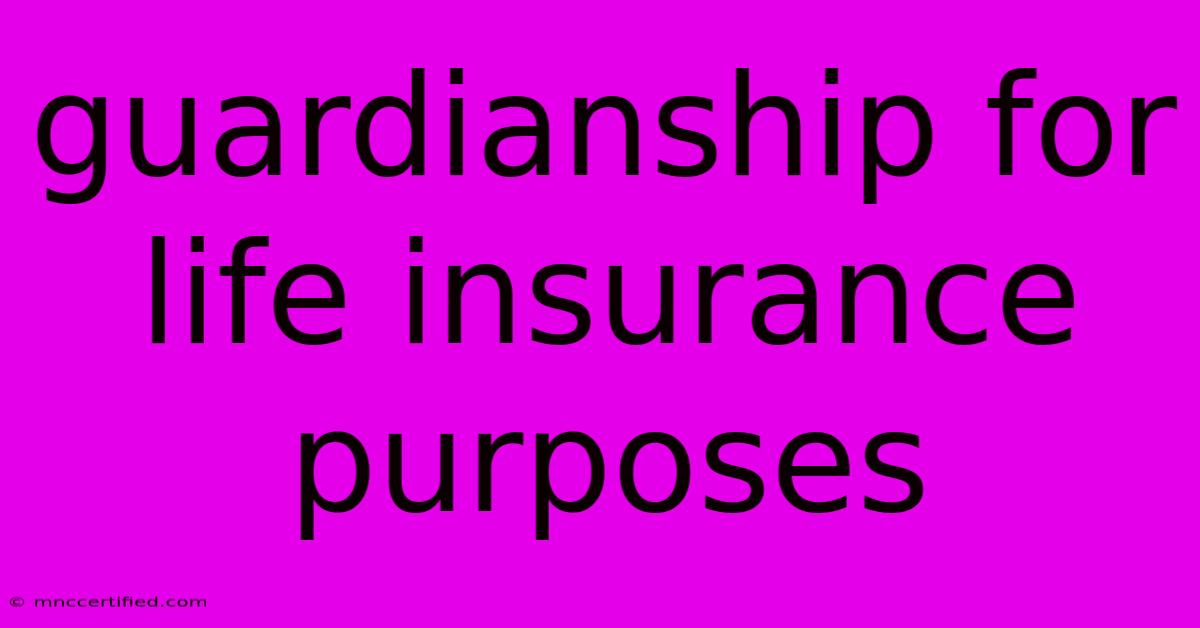Guardianship For Life Insurance Purposes

Table of Contents
Guardianship: Ensuring Your Loved Ones are Protected When You're Gone
Life insurance is a crucial tool for financial security, especially when it comes to protecting your loved ones after you're gone. However, there are instances where simply naming a beneficiary might not be enough. This is where the concept of guardianship comes into play, particularly when it comes to life insurance for minors.
Why is Guardianship Important for Life Insurance?
When a minor child is the beneficiary of a life insurance policy, the insurance payout becomes part of their estate. However, minors cannot manage their own finances. This is where guardianship comes in:
- Financial Management: A guardian appointed by the court has the legal authority to manage the child's finances, including the life insurance payout. This ensures the funds are used responsibly for the child's needs, education, and well-being.
- Legal Protection: Without a designated guardian, the child's inheritance could be subject to legal disputes or mismanagement. Guardianship ensures that the child's interests are protected.
- Peace of Mind: Knowing that your child's future is secure financially gives you peace of mind and allows you to focus on other important end-of-life arrangements.
Types of Guardianship for Life Insurance
- Legal Guardianship: This is the most common type of guardianship and grants a designated individual the legal right to care for the child, make decisions about their education, healthcare, and finances.
- Custodial Guardianship: This type of guardianship focuses specifically on managing the child's finances and assets, including the life insurance payout.
How to Set Up Guardianship for Life Insurance
- Consult an Attorney: An attorney specializing in estate planning can help you understand the legal requirements for guardianship in your state and guide you through the process.
- Choose a Suitable Guardian: Select someone you trust implicitly and who has the ability and willingness to handle the responsibilities of guardianship.
- Document Your Wishes: Clearly outline your desires regarding guardianship in a legal document, such as a will or a revocable living trust.
- Name a Guardian on Your Life Insurance Policy: Include the chosen guardian's name on the beneficiary designation for your life insurance policy.
Choosing the Right Guardian
- Trustworthiness: The guardian should be someone you trust to act in your child's best interest, with a strong moral compass and a history of responsible financial management.
- Compatibility: Consider the guardian's relationship with your child and their ability to provide a supportive and nurturing environment.
- Financial Stability: Guardianship involves significant financial responsibilities, so it's important to choose someone who is financially stable and capable of managing the life insurance payout effectively.
- Location: It may be advantageous to choose a guardian who lives in close proximity to your child, making it easier to manage their day-to-day needs and ensure ongoing communication.
The Importance of Open Communication
Talking to your loved ones about your plans for guardianship is essential. Open communication helps them understand your intentions and allows them to express their concerns or offer support. It also ensures that everyone involved is on the same page and can work together to ensure your child's well-being.
Conclusion
Guardianship is an important consideration when planning for your loved ones' future, especially when it comes to life insurance for minors. By taking the time to establish clear guardianship arrangements, you can ensure your child's financial security and well-being, even after you're gone. Remember, it's never too early to start planning for the future, and a little effort now can make a big difference in the lives of those you love.

Thank you for visiting our website wich cover about Guardianship For Life Insurance Purposes. We hope the information provided has been useful to you. Feel free to contact us if you have any questions or need further assistance. See you next time and dont miss to bookmark.
Featured Posts
-
Del Montes New Snack Range Focuses On Natural Ingredients
Nov 08, 2024
-
Lancashire M6 Fatal Crash Driver Killed Injuries
Nov 08, 2024
-
Contractor Pollution Liability Insurance
Nov 08, 2024
-
Kinsale Insurance Company Am Best Rating
Nov 08, 2024
-
Hamas Discusses Murdered Captive On Al Jazeera
Nov 08, 2024